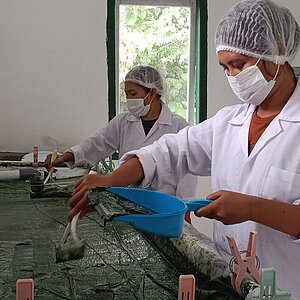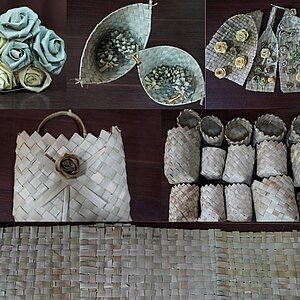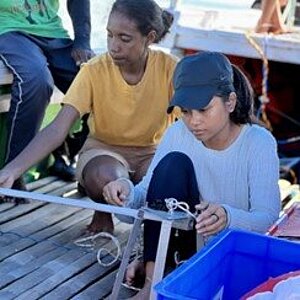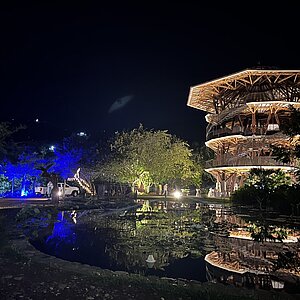Bridging climate action, biodiversity conservation, and sustainable livelihoods

Seagrass ecosystems are vital for climate resilience, biodiversity conservation, and the livelihoods of coastal communities. Seagrass conservation initiatives under an IKI project are empowering local communities, enhancing biodiversity, and driving sustainable climate solutions.
In the shallows of our oceans lies an unsung hero—seagrass. These unassuming underwater meadows capture carbon, food for endangered species like dugongs and sea turtles, and protect our coastlines from erosion. Yet, they remain one of the least understood and most overlooked ecosystems on our planet. But the Seagrass Ecosystem Service Project funded by the International Climate Initiative (IKI), however, is changing the narrative, transforming seagrass conservation into a vibrant tapestry of community-led action, scientific discovery, and resilient local economies.
The project, led by Conservation of Migratory Species of Wild Animals (CMS) Abu Dhabi office (under the umbrella of Dugong MOU) and a network of dynamic partners, is making waves in six key Asia-Pacific countries: India, Indonesia, Malaysia, Thailand, The Philippines and Timor-Leste. Launched in 2019 the project is setting new standards in marine conservation with the support from leading institutions like Edith Cowan University, Project Seagrass, Seagrass Watch, Murdoch University, Blue Ventures, Marine Research Foundation and innovative private companies such as PT Niras Indonesia together with the locally based NGO partners. Each achievement underscores a collective effort that combines expertise and local engagement to protect these crucial ecosystems.
Connecting conservation across the region: a unified approach
The Coral Triangle—often called the “Amazon of the Seas”—is renowned for its marine biodiversity and ecological significance, and is the heart of this project. Here, in a region teeming with marine life, local communities are reclaiming their roles as custodians of the ocean.
Here’s a snapshot of how the initiative is making waves with the support of national partners (NGOs):
Timor-Leste
Blue Ventures-Timor Leste revitalised Tara Bandu, merging cultural heritage with modern science to strengthen local seagrass conservation. The project has recently reached a major milestone with an agreement to develop a new locally managed marine area (LMMA) to safeguard 1,100 hectares of critical fisheries habitat, including seagrass meadows, coral reefs, and mangroves.
Indonesia
YAPEKA (Yayasan Pemberdayaan Masyarakat dan Pendidikan Konservasi Alam) has leveraged data from the Allen Coral Atlas and primary data from field to establish a protected fishing zone in North Sulawesi, enhancing seagrass habitat conservation. North Sulawesi's marine areas are characterized by unparalleled biodiversity and ecological significance, making them vital for both environmental health and local economies.
The Philippines
The C3 (Coastal Conservation and Communication) team and the Zoological Society of London (ZSL) secured the inclusion of seagrass in the zoning of the Environmentally Critical Areas Network (ECAN) in Palawan. Seagrass meadows in Palawan are of significant importance to artisanal fisheries. One of the most important fishes includes the rabbitfish.
Malaysia
MareCet Marine Mammal Research and Conservation (MareCet) contributed to the revision of the Dugong National Plan of Action (NPOA), Second Edition, introducing updates for seagrass protection and improved monitoring. This involvement is part of their ongoing efforts to enhance the conservation status of dugongs and their habitats, particularly in the Sibu-Tinggi Archipelago, which is located off the east coast of Johor.
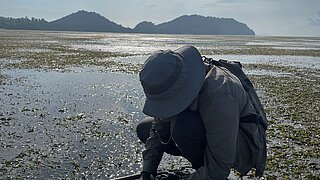
Thailand
The Save Andaman Network (SAN) worked with local stakeholders to integrate the Dugong and Seagrass Conservation Plan into the Trang Provincial Development Plan and facilitated an Memorandum of Understanding (MOU) for waste management and conservation uniting 40 stakeholders. Trang Province is home to the largest population of dugongs in Thailand.
India
The Organisation for Marine Conservation, Awareness and Research (OMCAR Foundation) organised a drone technology workshop for forest offices in the Palk Bay region to improve monitoring of coastal and marine ecosystems. India's first Dugong Conservation Reserve has been officially established in the Palk Bay, which is crucial for the connectivity of dugongs between India and Sri Lanka, as this region serves as an important habitat for these endangered marine mammals and their seagrass ecosystems.
Empowering communities: turning local innovation into conservation success
In remote corners of the Asia-Pacific region, conservation and commerce are coming together in ways that boost local economies and protect the environment. The IKI project supported community-driven initiatives that combine local livelihoods with conservation. In Thailand, Indonesia, and Timor-Leste, community-run homestays, spirulina ponds, and Palmyra leaves handicrafts are generating financial benefits while supporting environmental conservation.

Guests are welcomed not just into homes but into a philosophy—10-15% of every tourist dollar goes back into conservation. Travelers leave with memories, and communities gain resources to keep their natural heritage alive. Likewise, the spirulina ponds are not just producing superfoods—they’re empowering women. Community-run and sustainable, these ponds offer an income source that doesn’t deplete marine resources, proving that economic resilience and environmental health can go hand in hand. Women artisans are transforming Palmyra leaves into marketable crafts. Each piece sold tells a story of resilience, connecting rural economies to a broader conservation movement.
This blend of business and stewardship shows that when local people benefit directly from conservation, the impact is profound and lasting.
Advancing science: bridging gaps in knowledge
The project’s scientific achievements demonstrate the power of integrating community engagement with research. By working with local NGOs and universities, the project has achieved a major milestone: the successful evaluation of blue carbon stocks and seagrass ecosystem services. This research is crucial for national-level carbon accounting and climate strategies. The generated data and reports are all available online on the project website.
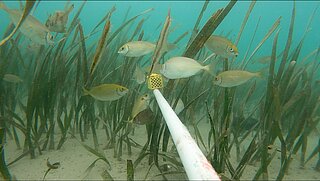
By involving local volunteers in data collection, the project is breaking new ground in the understanding of seagrass and its role in the global carbon cycle.
Community members, once seen as bystanders, are now frontline researchers. Trained in monitoring seagrass health and measuring carbon sequestration, these citizen scientists are gathering data that fills critical gaps in our knowledge. Their work is essential for accurate carbon accounting at the national level, proving that science isn’t just for scientists—it’s for everyone with a stake in the future.
Why this matters
More than just underwater plants; seagrasses are key players in regulating our climate and supporting marine biodiversity. The Seagrass Ecosystem Service Project is an example of how the integration of local knowledge, innovative business models, and cutting-edge research can drive effective environmental solutions.
This project is a testament to how collaborative efforts can tackle climate change and biodiversity loss. By restoring ecosystems, empowering communities, and advancing critical research, it offers a blueprint for addressing our intertwined environmental challenges. As global leaders approach CBD COP 16, the project’s success underscores the importance of nature-based solutions rooted in local engagement and scientific evidence.
The Seagrass Ecosystem Service Project demonstrates the power of combining local action with global goals, and how integrated approaches can lead to a sustainable future for our planet.
The link has been copied to the clipboard
Contact
IKI Office
Zukunft – Umwelt – Gesellschaft (ZUG) gGmbH
Stresemannstraße 69-71
10963 Berlin
Further information
For more information about the Seagrass Ecosystem Services Project, visit the website of the Dugong & Seagrass Hub.
Voices from the field:
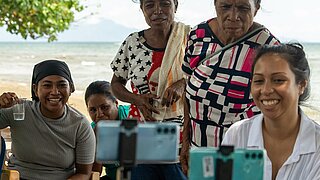
Sometimes, the most powerful stories come directly from the people who live them. That’s why the project uses participatory videos, created by the communities themselves. From Indonesia to the Philippines, these videos capture raw, unfiltered perspectives on conservation. They’re not just media—they’re a form of empowerment, giving local voices a platform on the global stage.








